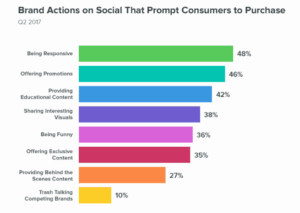Lead generation is undeniably the most crucial customer acquisition strategy for an eCommerce business. Relying only on your product/service quality is like living in the dark. You will be surprised to know that only 4% of people visiting your website are potential buyers. Your customers need to know who you are, where you are, and why you are there! Lead generation helps you find people interested in your offerings and willing to buy from your brand.
Lead generation strategies can bring a significant amount of relevant traffic, which eventually leads to your business growth. Although eCommerce is a dynamic market, some lead generation strategies are evergreen and all-time hits to gain customers. Let’s dig deeper into top 6 lead generation strategies that will help you convert more customers:
#1. Stay Connected via Push Notifications
Ask your visitors if they would want to opt for push notifications. This way, they will receive an alert every time you share information. The trick here is to reach out to your push notification subscribers only when you have something valuable to share.
Push notifications have a bad reputation because many websites overuse them with intrusive pop-ups that come up often to irritate the visitors.
Think of using a single push notification when people signup for your emails. Alternatively, they can appear when the visitor abandons a cart, with a relevant offer. Give them time to read the content before the notification appears. If you are using the notifications on a blog, send them similar article recommendations that appear when they scroll to a certain point on the page.
The trick here is to test multiple options and stick to the one that yields the best results. Ensure that you include a CTA in the push notification. In case if it is for a product discount, include high-quality images and the right copy to grab the user’s attention.
Truepush, a free push notifications provider, helps you engage with your website visitors to convert the leads into customers.

#2. Social Proof
More than anything else, people today are interested in knowing what others have to say about you. Don’t hesitate to showcase your clientele, their reviews, and logos on your eCommerce platform, of course with their consent.
Birchbox that offers monthly grooming and beauty subscription boxes uses customer testimonials on the homepage. To boost credibility, they add the customer’s photo and product image in the review.

Reviews, ratings, celebrity endorsements, testimonials, social media comments and product feedback are great ways to ensure that new customers and website visitors get that sense of confidence from your business.
Break them down into separate segments on your landing pages, use them on social media, ask the users to review you on third-party publications, and include the case studies in your blog posts to keep the visitors hooked.
TrustPulse, a social proof tool for websites, automates social proof by displaying real-time customer activity in the form of un-obstructive notifications.
#3. Content Marketing
If you want customers to trust you with their investment, you need to bring them to your website, educate them. This allows you to direct them to take the action that you desire. Let’s take the example of Switchback Travel:

When you come across this page on Google, the caption intrigues you to visit the website. When you click on the link, the page has all the necessary information about selecting the best tent with an appropriate feature-packed list to compare several products and make your decision.

That’s how you can use the content for marketing your product and convincing your customers to buy it. Provide value to your customers, use content to solve their pain points, answer their frequently asked questions, and build awareness about how your product makes their life easier.
#4. SEO Matters
You cannot exist on the internet without optimizing your eCommerce website for search engines. SEO forms the basis of your visibility and reach to your target audience. Optimize your product descriptions, blogs, website information, and the images on the website.
Search engine optimization ensures that your target audience is aware of your brand’s existence and is an integral part of every digital marketing campaign.
Look at the product description, title, and content of Switchback Travel; you will see it perfectly balanced with the right keywords to mark its visibility on the internet. Focus on both on-page and off-page

#5. Social Media Marketing
With over 3.4 billion social media users in 2019, it is an important communication channel for brands. eCommerce brands are using social media to raise brand awareness, engage with their leads, acquire users, increase conversions and provide customer support.
As per Sprout Social, engaging with customers on social media can even lead to a purchase. These statistics prove that customers are more likely to purchase when you:
- Answer their questions on social media platforms
- Provide educational content
- Offer promotions

While there are more than 200 social media channels, selecting the right channel for your eCommerce brand will depend on:
- What are your goals? Are you using social media marketing for lead acquisition? Or to create a brand presence?
- The channels your target audience uses frequently.
- The type of content you plan to create and promote. This can range from blogs, video content to images.
- How many social media channels can you manage with your current bandwidth?
- The social media platforms your competitors are using.
The most popular social media channels you can explore are:

A few actionable social media marketing tips, irrespective of the channel you use for marketing your brand are:
- Identify the best time to post and post consistently.
- Use high-quality images, videos, and engaging copy.
- Consider repurposing content giving due credits to the creators. You can post valuable content created by other brands in your industry.
- Engaging with your followers, answering their queries, and addressing their feedback, both negative and positive.
- Leveraging hashtags, live videos, and paid advertisements to reach new audiences.
With social media marketing, there are no one-size-fits-all. The right social media strategy would depend on the nature of your business, audience demographics, the type of content you plan to create, and your budget.
#6. Converting Your Existing Traffic Into Customers
It could be as simple as converting a complex lead capture form into a simple one. Even removing a single field in the form can increase conversions by 26%.

An alternative is to remove excess content from the landing page. Use a heat map to identify the sections on the page that aren’t grabbing attention. Have a homepage that is easy to navigate and has a clean design.
The additional issues preventing the leads from converting into paying users could be:
- Lack of clarity on the money-back or shipping charges.
- Lack of clarity on the product’s effectiveness or lack of credibility.
- Failing to highlight the key benefits of your offering.
Although you cannot convert every visitor who lands on your website, addressing their needs helps.
Have they landed on your website from the Instagram Ad with the coupon code? As they are ready to make the purchase, show them the products.
Did they land on a blog post from Google search? Did they land on the blog post via Google search? Share as much information as you can, so that they trust you and feel comfortable to hit the “buy” button.
Don’t stop testing every element on your website. With so much competition, eCommerce lead generation isn’t easy. You can’t afford to wait for customers to come to you. Find out where they are. Drag them back to your store. Give them a strong reason to keep visiting your store. That’s the secret to converting leads into customers to generate sales.
About the author – Afzal Khan is a certified digital marketing &
DepositPhotos – ecommerce


